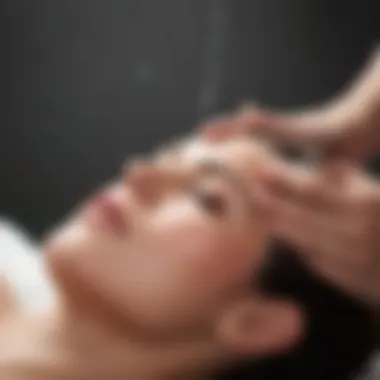Understanding Itchy Hair: Causes, Remedies, and Prevention Guide


Insider Beauty Tips
Itchy hair can be an incessant bother for many individuals, leading to discomfort and frustration. Understanding the causes behind itchy hair is crucial in effectively tackling this issue. Common culprits include dry scalp, product buildup, allergic reactions to hair products, and even certain skin conditions. By identifying the root cause, you can tailor your remedies more accurately to alleviate the itchiness.
When it comes to remedies for itchy hair, natural solutions often provide gentle and effective relief. Ingredients like aloe vera, tea tree oil, and coconut oil are known for their soothing and anti-inflammatory properties, making them great choices for calming a distressed scalp. Additionally, incorporating a gentle shampoo specifically designed for sensitive scalps can make a significant difference in reducing irritation and itchiness.
Prevention plays a vital role in maintaining a healthy scalp and minimizing the occurrence of itchiness. Regularly cleansing your scalp, avoiding harsh chemical-laden hair products, and maintaining a balanced diet rich in essential nutrients can all contribute to a healthier scalp environment. By implementing these preventive measures, you can proactively care for your hair and scalp, reducing the chances of experiencing itchiness in the future.
Impact on Hair Health
Weakened Hair Follicles
Itchy hair can compromise the health of hair follicles, leading to weakened strands and increased hair breakage. Persistent itching and irritation on the scalp can damage follicles, affecting hair growth and strength. Strengthening hair follicles through nourishing treatments, scalp massages, and targeted care can help improve hair resilience and reduce breakage. Addressing scalp itchiness is essential in preserving hair follicle health and promoting stronger, more resilient hair. By strengthening follicles and promoting scalp health, individuals can minimize breakage and support healthier hair growth.
Dullness
Itchiness on the scalp can contribute to hair dullness and lackluster appearance. The presence of itchiness and discomfort can impact the overall condition of hair, leading to a lack of shine and vitality. Revitalizing hair through moisturizing treatments, scalp hydration, and nutrient-rich products can help combat dullness and improve hair appearance. Enhancing scalp health is key in restoring hair vibrancy and shine, counteracting the effects of itchiness and promoting healthier-looking hair. By addressing dullness at the root cause, individuals can achieve smoother, shinier hair and maintain optimal hair health.
Breakage
Itchy scalp can result in hair breakage due to repeated scratching, increased tension on hair strands, and scalp inflammation. The cycle of itching and scratching can weaken hair shafts, leading to breakage and hair loss over time. Preventing breakage requires managing scalp itchiness through moisturizing treatments, scalp soothing methods, and avoiding excessive scratching. By addressing the underlying cause of itchiness and promoting healthy scalp habits, individuals can reduce breakage, support hair strength, and maintain fuller, healthier-looking hair. Defending against breakage is critical in preserving hair length and volume, fostering a resilient and vibrant hair appearance.
Effective Remedies for Itchy Hair
In addressing itchy hair, effective remedies play a crucial role in providing relief and promoting a healthy scalp. These remedies aim to combat the root causes of itchiness, such as dryness, product build-up, or allergic reactions. By incorporating a proper regime of remedies into your hair care routine, you can alleviate discomfort and improve the overall health of your hair and scalp.
Natural Remedies


Apple Cider Vinegar Rinse
Apple Cider Vinegar Rinse is widely recognized for its acidic properties, which help restore the scalp's natural p H balance. This remedy is particularly beneficial for individuals struggling with scalp imbalances, as it can reduce flakiness and irritation. Despite its strong odor, the antifungal and antibacterial properties of Apple Cider Vinegar make it a popular choice for combating itchiness.
Aloe Vera Gel
Aloe Vera Gel is a versatile remedy known for its soothing and moisturizing effects on the scalp. It promotes scalp health by nourishing it with essential vitamins and minerals, reducing inflammation and irritation. The cooling sensation of Aloe Vera Gel provides immediate relief to itchy and irritated scalp, making it a preferred natural remedy for many.
Coconut Oil Massage
A Coconut Oil Massage serves as a luxurious treat for both your hair and scalp. Its deep conditioning properties help hydrate the scalp and lock in moisture, reducing dryness and itchiness. While Coconut Oil may be a bit heavy for some hair types, its effectiveness in promoting scalp health and hair growth makes it a popular choice among those seeking natural remedies.
Over-the-Counter Solutions
Anti-Dandruff Shampoos
Anti-Dandruff Shampoos are formulated with active ingredients like zinc pyrithione or ketoconazole to target dandruff-causing fungi and bacteria. These shampoos effectively reduce flaking and soothe itchy scalp, providing long-lasting relief when used consistently. While beneficial for managing dandruff-related itchiness, it is essential to choose a shampoo that suits your hair type and scalp condition.
Scalp Serums
Scalp Serums are concentrated formulas designed to nourish and revitalize the scalp, promoting overall scalp health and combating itchiness. These serums often contain vitamins, antioxidants, and essential oils that penetrate the scalp to soothe irritation and improve circulation. Incorporating a scalp serum into your hair care routine can address specific scalp concerns and enhance the effectiveness of other remedies.
Professional Treatments
Scalp Exfoliation
Scalp Exfoliation involves the removal of dead skin cells and product build-up from the scalp, ensuring optimal scalp health. By unclogging pores and promoting cell turnover, scalp exfoliation can alleviate itchiness and enhance the absorption of other hair care products. While this treatment offers multiple benefits, it is crucial to consult a professional to determine the frequency and technique suitable for your scalp type.


Keratin Treatments
Keratin Treatments provide a long-lasting solution for individuals struggling with dry, frizzy, or damaged hair. These treatments infuse keratin protein into the hair shaft, reducing frizz, increasing hair strength, and improving overall hair texture. While keratin treatments offer remarkable results in restoring hair health and manageability, it is essential to follow post-treatment care instructions to maintain the benefits and prevent scalp irritation.
Preventive Measures for Itchy Hair
Preventive measures play a crucial role in managing and preventing itchy hair. By adopting healthy practices, individuals can promote scalp health and minimize discomfort. Consistency in preventive care can lead to a significant improvement in overall scalp condition and hair health. Understanding the importance of proactive steps is essential in curbing issues related to itchiness.
Healthy Hair Care Practices
Regular Washing
Regular washing is a fundamental aspect of maintaining scalp hygiene. It involves cleansing the scalp and hair regularly to remove dirt, product residue, and excess oils. By doing so, individuals can prevent the accumulation of impurities that may contribute to itchiness. The key characteristic of regular washing lies in its ability to promote a clean and healthy scalp environment, which is vital for reducing scalp irritation and itchiness. It is a popular choice among individuals looking to enhance their hair care routine due to its simplicity and effectiveness. While regular washing can benefit scalp health, excessive washing may lead to dryness and irritation in some cases.
Using Gentle Products
Using gentle hair care products is essential for individuals with sensitive scalps prone to itching. Gentle products are free from harsh chemicals and fragrances that could potentially irritate the scalp. The key characteristic of using gentle products is their mild and non-irritating formulation, specifically designed to minimize scalp reactions. This approach is favored for its ability to soothe and nourish the scalp without causing further discomfort. However, it is important to note that while gentle products are ideal for sensitive scalps, they may not provide the same level of cleansing as stronger formulations.
Scalp Massage
Scalp massage is a therapeutic practice that involves gently manipulating the scalp to improve blood circulation and relax the muscles. The key characteristic of scalp massage is its ability to stimulate the hair follicles and promote hair growth. It is a popular choice for enhancing scalp health and reducing tension and stress. The unique feature of scalp massage is its holistic approach to scalp care, addressing both physical and mental well-being. While scalp massage offers relaxation and potential benefits for scalp health, excessive or aggressive massage techniques may cause more harm than good if not performed correctly.
Balanced Diet and Hydration
Nutrient-Rich Foods
Nutrient-rich foods play a vital role in maintaining overall health, including scalp health. Consuming a diet rich in essential nutrients such as vitamins, minerals, and antioxidants can support hair growth and scalp condition. The key characteristic of nutrient-rich foods is their ability to nourish the body from within, promoting healthy hair growth and reducing scalp issues. This dietary choice is beneficial for individuals looking to improve their hair quality and combat itchiness. However, it is important to ensure a balanced intake of nutrients to avoid potential deficiencies that could impact overall health.


Adequate Water Intake
Adequate water intake is crucial for hydrated and healthy hair and scalp. Staying properly hydrated helps in maintaining the natural moisture balance of the scalp, reducing dryness and itchiness. The key characteristic of adequate water intake is its role in promoting overall hydration, benefiting not only the scalp but also the entire body. This practice is popular for its simplicity and effectiveness in supporting optimal scalp health. However, excessive water intake may lead to imbalances in the body, so moderation is essential in achieving the desired benefits.
Avoiding Triggers
Harsh Chemicals
Harsh chemicals present in hair care products can damage the scalp's natural barrier, leading to irritation and itchiness. Avoiding products containing sulfates, parabens, and synthetic fragrances is essential to prevent scalp reactions. The key characteristic of harsh chemicals is their potential to disrupt the scalp's p H balance and cause adverse reactions. This avoidance strategy is beneficial for individuals seeking to maintain a healthy scalp and reduce itchiness. However, it is important to carefully read product labels and choose gentle alternatives to minimize scalp discomfort and sensitivity.
Tight Hairstyles
Wearing hairstyles that exert pressure on the scalp, such as tight ponytails or braids, can contribute to scalp irritation and itchiness. Choosing loose hairstyles that do not tug on the scalp can help reduce discomfort. The key characteristic of tight hairstyles is their potential to strain the hair follicles and irritate the scalp, leading to itchiness and hair breakage. Opting for gentle hairstyles that allow the scalp to breathe is advantageous for individuals looking to prevent scalp issues. While tight hairstyles may offer aesthetic appeal, they can compromise scalp health if worn continuously without giving the scalp a break.
Consulting a Dermatologist
In the realm of tackling the bothersome issue of itchy hair, consulting a dermatologist emerges as a pivotal step towards regaining scalp health and comfort. The guidance of a dermatologist holds significant weight in addressing persistent itchiness that standard remedies might not alleviate effectively. Dermatologists are equipped with specialized knowledge and tools to diagnose underlying scalp conditions accurately, leading to tailored treatment plans. Their expertise allows them to identify specific triggers causing itchiness, whether it be related to allergies, infections, or other dermatological concerns. By consulting a dermatologist, individuals can access expert advice on managing itchy hair, ensuring that the root cause is adequately addressed for long-term relief and improved scalp health.
When to Seek Professional Help
Persistent Itching
c Persistent itching, characterized by enduring discomfort and recurrent episodes of itchiness, serves as a clear indication to seek professional help from a dermatologist. This persistent sensation of itchiness may signal more complex underlying issues that require specialized care. Consulting a dermatologist when experiencing persistent itching is essential to pinpoint the exact cause and formulate an effective treatment plan. Their expertise in diagnosing and treating dermatological conditions ensures a comprehensive approach to resolving persistent itching, addressing both symptom management and long-term scalp health.
Severe Symptoms
When it comes to severe symptoms related to itchy hair, seeking professional help is imperative for prompt intervention and effective management. Severe symptoms such as intense scalp irritation, inflammation, and significant hair loss warrant immediate dermatological assessment. Dermatologists can accurately evaluate the severity of symptoms, ruling out serious scalp conditions and providing targeted interventions. Their ability to recommend advanced treatment options and monitor progress is invaluable in mitigating the impact of severe symptoms on scalp health and overall well-being.
Conclusion
In the constantly evolving realm of hair care, understanding the nuances of dealing with itchy hair is of paramount importance. It serves as the culmination of a comprehensive guide, like a compass guiding us through the labyrinth of scalp discomfort. The Conclusion section acts as a beacon of clarity, summarizing key causes, effective remedies, and prevention strategies discussed in the preceding sections. It underscores the significance of adopting healthy scalp habits not just as a reaction to itchiness but as a proactive approach to overall hair wellness. By embracing the insights shared in this article, individuals can embark on a journey towards a more serene and comfortable hair care routine, free from the irritation and inconvenience that itching can bring about.
Embrace Healthy Scalp Habits
Diving into the specifics of maintaining a healthy scalp, 'Embrace Healthy Scalp Habits' stands as a pivotal segment in the narrative on combating itchy hair. The focus here is not merely on addressing symptoms but on cultivating enduring routines that foster scalp health. From gentle product choices to the art of scalp massage, each aspect underscores a holistic approach to hair care. Regular washing, often overlooked, emerges as a foundational practice that sets the stage for a healthy scalp environment. The subsection also advocates for the incorporation of nutrient-rich foods and ample hydration into one's lifestyle, recognizing the intrinsic link between internal nourishment and external vitality. Avoiding triggers like harsh chemicals and tight hairstyles is not just a suggestion but a cornerstone of preventive care, shielding the scalp from potential irritants. Embracing healthy scalp habits transcends reactive measures, embodying a proactive stance towards long-term hair wellbeing.







